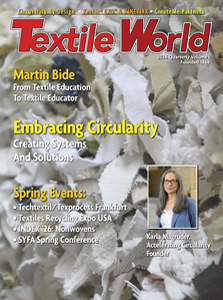ROUBAIX, France — August 2012 — The CETI is the world’s most recent research and prototyping centre
dedicated to new textile applications. At the heart of a first-class scientific network, the CETI
uses creativity techniques that accelerate the innovation process leading from uses to solutions.
Bringing together state-of-the-art equipment in one place allows industrialists to quickly advance
from research to prototypes and small series as soon as possible. The CETI’s inauguration is
scheduled for 10th and 11th October 2012.
The CETI’s mission
The CETI’s mission is to promote innovation through applied research by bringing
universities, laboratories and industry closer and creating links with the markets in order to
offer textile materials excellent prospects for the future.This involves understanding innovation
by rethinking its applications, combining skills, pooling resources and optimising solutions.
The CETI’s objectives
The CETI’s priority is to place innovation at the forefront of winning strategies by
facilitating technological development and industrial transfer. By creating a unique technological
platform in Europe with all technologies for developing innovative textiles, the CETI has set
itself several objectives:
• Developing new applications for intelligent textiles,
• Boosting the textile sector by diversifying technological research in various sectors,
• Developing cross-sector collaborative projects,
• Favouring interdisciplinarity and exchanges between application research and industrial
production,
• Accelerating the innovation transfer processes with concrete and rapid
applications(prototyping, small series, etc.)
The CETI’s players
Initiated by the UP-tex cluster, the CETI brings together various regional, national,
European and international players.The CETI is co-funded by Europe, the State, the local
authorities, the Ville Renouvelée semi-public limited company, the Union, the Caisse des Dépôts and
Batixia. It is supported by its historical partners: ENSAIT, HEI, Ecole des Mines de Douai,the IFTH
(French textile-apparel institute), Lille 1 University, the Nord Textile Industries Union and
CLUBTEX.
The CETI participates with them in an active network established with researchers from
business schools, universities,UP-tex competitive clusters, Techtera and Natural Fibre Clusters.
The CETI’s means
The CETI, a scientific research and development pool situated at the crossroads of Northern
Europe in the new Roubaix/Tourcoing/Wattrelos eco-district of “L’Union”, the CETI is housed in a
daring and high-performance multi-purpose architectural complex comprising:
• A unique 8000 m² research platform equipped with high-tech laboratories, state-of-the-art
equipment intended for prototyping and small series and independent workshops equipped with the
latest machines.
• A 6000 m² building housing the UP-tex competitive cluster, the CLUBTEX business cluster,
the Pole of Textile Excellence,the INNoTEX incubator, the IFTH (French textile-apparel institute) ;
the site is equipped with a conference room, meeting rooms, offices and various exhibition areas
for welcoming companies and private laboratories.
The CETI’s equipment
The spinning tool (Phase 1) is used to develop tomorrow’s new high-performance fibres
essential for markets such as ultra-filtration,medical devices, intelligent textiles. There are
only 4 tools of this kind in the world
The Non-woven fabrics tool (Phase 1) is used to develop new industrial solutions with new
technological combinations. This market is expected to grow by 21% by 2017.
Phase 2 planned for 2013 and 2014 focuses on the manufacturing processes (knitting, weaving,
braiding), especially for the composite or technical fabric markets.
The CETI works with the PIVERT and IFMAS IEEDs (Institutes for Research Excellence in
Decarbonated Energy) to develop textile applications from the biopolymers that will be developed
there. This responds to a strong demand from companies in search of new raw materials
(biocompatible PET, biocompatible PP, biocompatible PLA, etc.).
The CETI’s customers
The CETI is open to all those looking for innovative solutions through a technological
textile platform associating high-performance tools, skills and specialist expertise: SMEs and
companies from all sectors, the sector’s industrialists and specifiers; technical centres and
R&D departments in major companies; private and public laboratories, competitive clusters, etc.
• The CETI’s customers (Phase 1) are major companies using textiles, especially in the
hygiene, filtration and medical sectors.
Companies producing Non-woven fabrics as well as polymer and fibre producers are also
concerned.
• SMEs also find new opportunities for cooperating with major clients within the CETI and can
also develop specific small series with Phase 2 tools.
The CETI in the world
From Phase 1, the CETI positions itself as an exceptional world-class centre. It
can be compared in terms of equipment to the “Non-Woven Institute” (NCRC) which federates over 60
major companies around the development of new textile materials from Raleigh in the USA. This
centre generates an annual turnover of over $ 4m.
In Europe, the offer is split between the major German centres (STFI (Saxon Textile Research
Institute) in Chemnitz and ITV (Institute of Textile Technology and Process Engineering) in
Denckendörf) and the CENTI (Centre for Nanotechnology and Smart Materials) in Portugal which also
has Hills tri-component spinning equipment.
It is in Phase 2 that the CETI comes into its own as it will then be the only platform in the
world to bring together in one place as much technological equipment associated to cutting-edge
research as is mainly found in the Advanced Textile Materials scientific interest group (GIS
MTA).The CETI’s challenges Beyond its commitment to the future of an entire sector, the CETI is
going to:
• Change the image of textile in order to make it an innovative material turned towards the
future in diverse leading markets (health, transport, protection, industry, environment, etc.)
• Create richness and jobs with new profiles and equip the region with an internationally
renowned high-performance tool
• Attract investors and generate collaborative projects for developing tomorrow’s textile.
Posted on August 14, 2012
Source: Re-Activ/Association CETI




